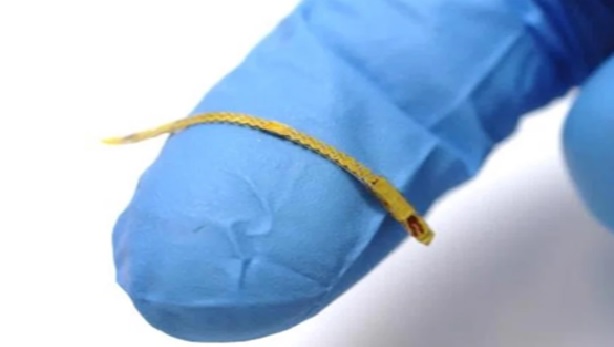Georgia’s New Wireless Sensor to Monitor Vascular Disease
Researchers from the Georgia Institute of Technology have published a study in the journal Science Advances on their present work on a technology that would allow for continuous monitoring of vascular disorders using wireless implanted devices.

Figure 1: wireless sensor to monitor vascular disease
Figure 1 shows that the team is working to improve hemodynamics (blood flow through the vascular system) monitoring in order to produce better treatments and patient outcomes. Hypertension and atherosclerosis, which can be fatal, are caused by a complicated circulatory system with arteries of various sizes and curvatures.
The Georgia team designed an electronic device consisting of a wireless stent platform with soft sensors added to meet insertion and operation criteria to deal with the twisting network of the vascular system. Furthermore, aerosol jet printing techniques can be used to print the devices. [1]
His wireless smart stent platform, integrated with soft sensors, is operated by inductive coupling to offer wireless real-time monitoring that can detect a wide range of vascular conditions. Inductive coupling uses magnetic fields for wireless energy transfer. It’s similar to what’s happening when you use a wireless charger for your phone, smartwatch, or other devices – they are gaining energy from the magnetic field created by the charger. [2]
The device, when implanted into a patient, expands and stops the artery from narrowing like a conventional stent while also supplying a constant stream of data to monitor the patient’s condition and provide information on the state of the device itself.
In addition to being implantable almost anywhere inside the body, the team are planning to develop a wearable version of their sensor system for ultimate lightweight portability.
While the technology has only been tested on animal models so far, Yeo and his team hope that with the backing of a $400,000 grant from the National Science Foundation (NSF) that that will be able to take the technology further.
The focus will be on finetuning the novel jet-printed nanomembrane sensors and other bioelectronics for wireless and wearable devices that would facilitate the continuous monitoring of vascular health.
Among the benefits of soft pressure sensors developed for this study, the scientists demonstrated conformability when integrated with the stent. [3]
References:
- https://www.electronicsforu.com/news/whats-new/georgia-techs-wireless-sensor-for-vascular-disease-monitoring
- https://research.gatech.edu/georgia-tech-researchers-develop-wireless-implantable-vascular-monitoring-system
- https://www.azosensors.com/news.aspx?newsID=15042
Cite this article:
Sri Vasagi K (2022), Georgia’s New Wireless Sensor to Monitor Vascular Disease, Anatechmaz, pp. 279

